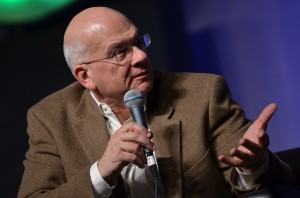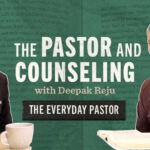Wait, another Tim Keller book for skeptics? Really?
Well, yes.
In Making Sense of God: An Invitation to the Skeptical (Viking) [20 quotes | review], Keller offers a prequel to his bestselling The Reason for God (2008). Whereas that book assumed interest in a rational case for the faith, Making Sense of God doesn’t. It starts farther back.
Christianity makes more “emotional, cultural, and rational” sense of our lived experience than any alternative worldview, Keller has long insisted. In The Reason for God, he made the rational case. In this volume, he tackles the other two.
I spoke with Keller—pastor of Redeemer Presbyterian Church, vice president of The Gospel Coalition, and master of the endnote (652 in this volume)—about new “apologetic” issues in the West, the faith of secularism, the ubiquitous harm principle, and more.
Over the last 20 years in the West, what are the biggest shifts in topics and questions most relevant to “pre-evangelism”? What convinced you this sort of book was needed as opposed to simply leaving it at The Reason for God?
The main shift seems to be that sexuality, same-sex marriage, and gender are now “apologetics” issues. That wasn’t the case 20 years ago. They didn’t come up in talking to non-Christians, but today they almost always do.
But I don’t think that’s actually the main shift. The biggest difference is that Christianity used to have cultural familiarity and modest respect. Most Americans not only had a rudimentary knowledge of Christianity but also tended to respect it, or at least feel they ought to show some respect. Also, 20 years ago, the hyper-individualistic narratives (“You have to be true to yourself”; “No one has the right to tell anyone else how to live”) weren’t as deeply entrenched in as many people. Today Christianity is culturally strange and not respected. This is the world in which we share our faith now.
What do you mean when you say secular people hold humanistic moral values “by faith alone”? 
The moral values of Judaism and Christianity flow from and fit the biblical view of the universe. If there is a personal God who made people in the image of God, then belief in equal human dignity and so on is a natural implication.
But secular people have a materialistic view of the universe—we aren’t here for any purpose, we evolved strictly through a process of the strong eating the weak, and nothing we do here will matter in the end, since everything will burn up in the death of the sun. Yet we’re told we shouldn’t live selfish lives, and we should treat everyone as having human rights. Humanistic values in no way fit with that view of the universe—they’re held despite that view of the universe. So if a secular person believes in humanistic values, it requires a gigantic leap of faith.
Rejecting “discovered” meaning, secular persons are left with only “created” meanings. How do these contrasting perspectives lead to the cultivation and suppression of thought, respectively?
As I mentioned, secular people espouse a materialistic view of the universe. When we die, we rot, and eventually no one will remember anything we’ve done. There will be no civilization to remember anything that was ever done. Nothing we do will make any lasting difference. Life is ultimately meaningless.
I believe the only way to “create one’s own meaning” in that context (e.g., by spending time helping the poor) and have a meaningful life is to suppress—to not think too much about your actual position. If you say to secularists, “You know, in the end nothing you do matters,” they will say, “Don’t be morbid; don’t think about that.” So meaningfulness comes through suppression.
For a Christian it’s the reverse. If you’re feeling down, like your life isn’t really counting, the solution is to cultivate rationality—to think more. Remind yourself that Jesus died for you and your future is secure, and that God is in charge of history and we will live forever with him in glory.
Secularists, then, get through ordinary life by not thinking too much about their view of the universe. Christians get through life by thinking more and more about it.
The idea that “everyone should be free to live as they desire as long as they don’t harm anyone else” is self-evident to many today. But why is this harm principle “useless and even disingenuous as a guide”?
People use the harm principle to appear non-judgmental. They say, “I’m not laying my moral principles on you—you can live any way you like, as long as you don’t harm others.”
But the definition of “harm” always assumes a set of particular moral beliefs. How do you know what harms human life unless you can first define what a good and thriving human life is? Does having sex outside of marriage harm people? The answer depends on how you understand the character and purpose of marriage, which entails a whole set of particular beliefs about human nature, the function of sexuality, and so on. So it’s disingenuous to use the harm principle to appear open-minded. Everyone uses “harm” to mean “harm according to my worldview about the nature of things.”
It’s also useless as a means to bring about consensus about how we can live together. We can’t agree on what harm actually is.
How does the Christian view of satisfaction avoid the pitfalls of both tranquility through detachment (ancient strategy) and happiness through acquisition (modern strategy)?
Trying to find happiness through acquisition of possessions is widely seen as a dead end. But the ancient (and Eastern) antidote is to not set your heart on anything, to detach, to become stoic so the loss of things doesn’t devastate you. This of course leads to a hardness of heart and is ultimately as selfish as acquisitiveness. It’s a way to protect the self from the inevitable grief that comes through love.
Augustine best presented the Christian answer. Don’t love people and things less—rather learn to love God more than anything else. That way their loss won’t overthrow you, and you won’t have to harden and detach your heart from things in order to survive.
“It’s an illusion to think identity is simply an expression of inward desires and feelings,” you observe. “Modern people are ultimately no more liberated to be themselves than ancient people were.” What do you mean?
Our inward desires are many, and they’re at odds with each other. We have lots of inward desires and feelings we reject as “not me,” while others we embrace as “me.” In the book I point out that ancient people were more willing to embrace aggressive feelings as signs of strength, but today we usually reject anger and aggression as a flaw and embrace sexual attractions as “the real me.”
There really hasn’t been a major difference over the centuries. We always tend to reject the feelings our culture says are bad and to embrace the ones our culture tells us are good. Contemporary people are no more liberated.
Reflecting on the reality of moral obligation, you write: “Over the years it has probably been at this very point that many of my secular friends and conversation partners have felt some unease with their own point of view. Most of the skeptics whom I have seen move toward faith later told me it was around this issue of moral obligation.” Why does this problem of moral obligation possess unique catalytic power?
I think the answer is largely given in my response to question 2. The biggest Achilles heel of modern secular liberalism may be the dissonance and disconnect between humanistic moral values and a materialistic view of the universe. Moral values are strongly held by most secular people, but the values have little basis in their own view of things. They seem almost arbitrary and ungrounded. Many of the people in New York City who come to faith feel the same ungroundedness.
Of course, it was Nietzsche who most ardently and eloquently argued that, if the secular view of the universe is right, there can be no moral obligation or humanistic values. I personally think his case is unanswerable.
When it comes to engaging the ideas in Making Sense of God, what generational differences do you perceive? Which themes resonate across older and younger demographics alike, and which are rather distinct?
My overarching point is that Christianity makes sense emotionally, culturally, and rationally. We come to believe in a universe without God—or with God—by consulting our emotions, relationships, and reason. Making Sense of God is actually a “prequel” to The Reason for God because it argues that Christianity makes sense emotionally and culturally. It shows that secularism has major problems giving people meaning, satisfaction, freedom, identity, and hope; Christianity has better resources for all of them. This does not, of course, prove Christianity is true. But it does make the case that if you really reflect on things, you should grant that it would be great if Christianity were true.
If after Making Sense of God you’re motivated to explore the rational case for Christianity, you can move on to The Reason for God. In general, I’d say that younger non-believers need to hear why Christianity makes emotional and cultural sense before they’re willing to devote significant time to weighing the more traditional, rational arguments for our faith.
Editors’ note: Tim Keller will be giving multiple talks at The Gospel Coalition 2017 National Conference, April 3 to 5 in Indianapolis. Browse the speaker list and register soon.
Download your free Christmas playlist by TGC editor Brett McCracken!
 It’s that time of year, when the world falls in love—with Christmas music! If you’re ready to immerse yourself in the sounds of the season, we’ve got a brand-new playlist for you. The Gospel Coalition’s free 2025 Christmas playlist is full of joyful, festive, and nostalgic songs to help you celebrate the sweetness of this sacred season.
It’s that time of year, when the world falls in love—with Christmas music! If you’re ready to immerse yourself in the sounds of the season, we’ve got a brand-new playlist for you. The Gospel Coalition’s free 2025 Christmas playlist is full of joyful, festive, and nostalgic songs to help you celebrate the sweetness of this sacred season.
The 75 songs on this playlist are all recordings from at least 20 years ago—most of them from further back in the 1950s and 1960s. Each song has been thoughtfully selected by TGC Arts & Culture Editor Brett McCracken to cultivate a fun but meaningful mix of vintage Christmas vibes.
To start listening to this free resource, simply click below to receive your link to the private playlist on Spotify or Apple Music.


































